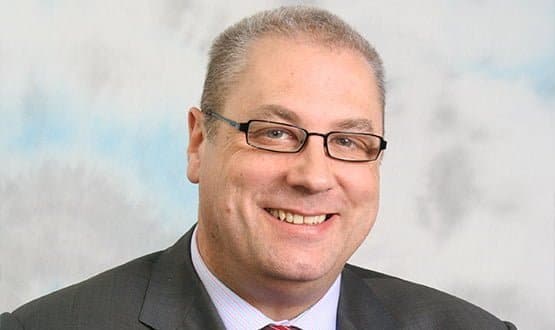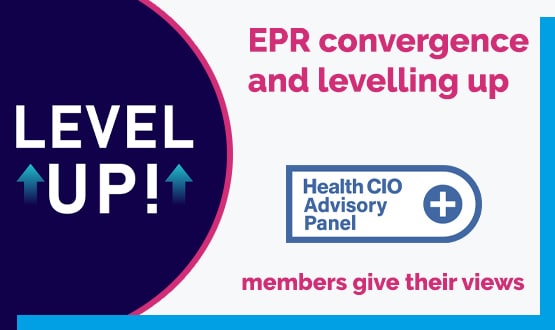Health CIO profile: Neil Darvill
- 7 October 2014

With more than three years to go, health secretary Jeremy Hunt’s vision of a paperless NHS by 2018 is close to being realised at St Helens and Knowsley Teaching Hospitals NHS Trust.
Wholesale digitisation and the introduction of electronic document management software mean that most paper records have long since been consigned to the waste bin.
“From a speed and efficiency perspective, it was like reaching the open motorway after being stuck behind a tractor on the Broads,” says the trust’s director of health informatics, Neil Darvill. He says that going electronic required three years of effective change management and close collaboration with his Health Informatics Service’s 14,000 IT users. As a result, most patient services are now run entirely electronically.
Creating solid foundations
Darvill says the shift was possible because he and his team did all the unglamorous work of creating good-quality infrastructures upfront. These reach beyond the trust across the local primary, community and mental health sectors.
“We ensured there were sufficient computers, that they were fast enough and that there was support to deal with any problems,” he says. “This enabled us to create an environment where healthcare staff no longer worry about whether the IT will work – it’s now a given.
“People who spend time picking the curtains before their foundations have been set probably won’t end up with a very reliable house,” he says. “To be honest, I think it’s about the art of the bleeding obvious.
“What’s important is to ensure that the underlying technology – be it infrastructure, devices or the services that support them – is sufficiently robust to empower and engender confidence in the users.
“I regularly have conversations with groups of users – thankfully no longer our own – who are chomping at the bit to become paper-lite and move to electronic patient records. But they invariably have huge anxieties about surrendering a system that they can be in control of for one that they’re not.”
Darvill believes it’s about getting users to take a leap of faith and wholeheartedly commit to a change management programme.
“When you go into a room of clinicians to discuss the next wave of system development, it’s important to spend most of the time telling them what it will do for them and how it will move them forward,” he says.
“You don’t spend the first half-hour telling them what to do when the computers don’t work. My basic approach is to build things up from the ground and make sure it all works for them.”
Career change
Darvill first entered the NHS from the private sector in 1992, after several years in management services within the textile industry.
Following a spell as a freelance management consultant to Blackpool Fylde and Wyre Hospitals NHS Foundation Trust, he was offered the job as head of IM&T.
Some three years later, he became director of IM&T at Royal Liverpool and Broadgreen University Hospital NHS Foundation Trust; after which, he took up his current job.
EHI’s Healthcare IT Champion of the Year in 2012 now has vast experience of healthcare IM&T. Unfortunately, he believes the standard of informatics capability in the NHS generally is pretty low, and that many organisations find it a struggle.
“I’m constantly disappointed by the standard of NHS IT,” he says. “Whilst I occasionally find it invigorating to see the wonderful things colleagues are doing, more often than not I scratch my head and wonder what the heck trusts are doing and how they can get away with it.
“Indeed, I have the greatest sympathy for the informatics staff in that situation. They are almost certainly hard-working and dedicated individuals trying to do their best.
“But they often find themselves in a fairly leaderless environment; one with no corporate engagement, no connection to the executives or to the board, no strategy, empowerment or development. As a consequence, these organisations end up with a service they deserve.
“I believe it is the board and executive management’s responsibility to empower themselves with a service – whether that be in-house, shared, outsourced or whatever – and to equip themselves with the capability they need to deliver their business objectives.
“All too often, I find that organisations’ business objectives are not connected to their informatics service – and that seems to me to be a really ludicrous way of going about things.
“Having said that, there are many good examples within the NHS of where that’s been overcome and I believe it’s the responsibility of our service and others like ours to help other organisations. For that reason, we try to be as open and supportive as possible by inviting them to share our experience.”
Need for leadership and standards
Indeed, in a world of NHS IT where many organisations can seem intent on reinventing the wheel, rather than on learning from the experience of a neighbouring trust, Darvill and his Health Informatics Service stand out. Their branding is often seen at health IT conferences, and the HIS regularly plays host to representatives from other NHS trusts wishing to learn from its example.
“Collaboration and shared services are nowhere as prevalent in the NHS as they should be,” Darvill says. “Because of this, I believe many organisations do struggle, particularly with the informatics agenda.
“It seems crazy to me that there isn’t more appetite among trusts for collaboration and for sharing the success of others. I believe you shouldn’t just hide what you do, but rather get out there, do it well and then share it.”
Thanks to the development contracts commissioned by the now-defunct National Programme for IT, Darvill believes the NHS is not short of software. However, he thinks it doesn’t use it particularly well, and that it doesn’t embed good practice well.
“What was really needed [from NPfIT] was some standards, leadership, and lots of support to enable implementations to work well,” he says. “Unfortunately, there was very scant awareness of the change management agenda, which is probably 80% of the problem in most trusts. Change by definition brings with it anxiety, which in turn is difficult to manage.”
Opportunity for improvement
At the end of the day, though, Darvill believes the NHS – and HISs in particular – can rise to the challenge of working in a newly competitive health environment. He’s also committed to continuing to lead the way.
“It’s all about helping clinicians to help their patients by being brave and exploiting new technologies to bring about improvements in healthcare, even though the journey can be a little rocky at times,” he says.
| Fact box | |
| Name: | Neil Darvill |
| Job title: | Director of informatics at St Helens and Knowsley Teaching Hospitals NHS Trust and its Health Informatics Service |
| Time in current role: | 10.5 years |
| Key project: | The electronic document management project that has enabled St Helens and Knowsley to consign paper hospital medical records to the bin well ahead of the government’s 2018 ‘paperless’ target |
| Favourite technology: | Our e-Lloyd George (e-LG) service, a clever yet simple solution that turns records into electronic data, saving GP practice staff time, optimising use of space, whilst ensuring faster access to and better security of patient records via a secure online portal |
| Best thing about job: | “I get my buzz from helping clinical colleagues, who in turn get theirs from helping patients.” |
| Worst thing about job: | “As we’re in a shared service, I would prefer there to be more collaboration and for people to view issues outside of their individual organisational context.” |




